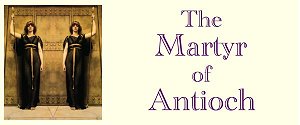At the meeting of the Provisional Committee, convened to begin making
arrangements for the 1880 Leeds Music Festival on 12 December 1877, the following
resolution was passed:
That the honorary secretary communicate with Mr. Arthur Sullivan as to
writing an oratorio for the Festival of 1880.
The secretary, Frederick Spark, accordingly wrote to Sullivan on 2 January
1878, encouraging to look favourably on the committee's invitation :
I need hardly tell you with what completeness, force, and exceptional choral power we should perform your work, for our recent production of Macfarren's
Joseph will be fresh in your memory, if you read or heard the universal praise
bestowed upon the Leeds Festival Performance.
Sullivan was abroad, and the invitation was acknowledged in his absence by
Markham Law. A second letter was sent on 29 January and a third on 18 February.
Three weeks later Sullivan telegraphed from London "Just returned home. Will
answer your letter tonight." On 12 March he replied as follows:
When I received your first letter at Nice, I was so ill and worn out that I at once wrote declining the offer of the Leeds Festival. But upon consideration, I thought
it would be wise to keep it back a short time, in case I might get better and stronger.
I was constantly ill at Nice, consequently the letter was never sent. On my
arrival home yesterday, I found that you had written to me again, and also to Mr. Law,
who unfortunately has been, and still is, in Italy.
I beg therefore you will accept my expressions of my sincere regret at the
delay in answering you. I am much better now, and feel more disposed to entertain the
proposal which the committee have done me the honour to make to me.
I could not, however, undertake the composition of an oratorio which should
occupy the whole of a concert. For that I should have no time. But I should not be
unwilling to write a work of about the same length and character as The Prodigal
Son - a work of about an hour or an hour and a half, and forming one part of a
concert.
Will you kindly convey this to the committee, and let me know their view on
the subject.
The committee formally accepted Sullivan's offer on 15 March and, following
a meeting of Spark and Sullivan in London, resolved on 9 April:
That Mr. Sullivan be commissioned to write a work of the nature mentioned
in his letter of March 12th, at a fee of 100 guineas. Such fee to include all his personal
expenses, and the providing the necessary copies for band and chorus.
Sullivan initially selected the subject of David and Jonathan for the work and
intended preparing the libretto himself. But this task defeated him. "I 'search the Scriptures' daily," he remarked to Spark on one occasion, "only to find that the best verses for filling up in the orthodox fashion have been used by oratorio writers before me. If I take these, there will be always comparisons drawn as to the setting. One will say, 'Oh, Handel's music to those words is much better,' or, 'Mendelssohn's ideas are far superior to Sullivan's.'"
In June 1880, the following notice appeared in the Leeds Express:
It has already been announced that Mr. Arthur Sullivan was engaged in
writing a new oratorio for the Leeds Musical festival, of which he is the conductor.
The libretto was taken from the Bible story of David and Jonathan, and Mr. Sullivan
has for some time (years, we believe) conceived the idea of setting music to this story.
He has now, however, abandoned the work, and has decided to write an entirely new
one. The reason for this was consciousness, when endeavouring to complete David
and Jonathan that words from the Sacred Book required a certain amount of
conventional treatment, somewhat limiting the composer's ideas. Mr. Sullivan, taking
counsel with his friend and co-worker, Mr. W. S. Gilbert, has selected the poem by
the late Dean Milman The Martyr of Antioch, which will be arranged and in part
re-written by Mr. Gilbert. The work will be a sacred cantata, and the words will give
scope for Mr. Sullivan's dramatic powers as a composer.
The Festival was very nearly postponed. Trade was very much depressed in the late 1870s and it seemed increasingly likely that a General Election would be called in the autumn of 1880. Before any decision was taken, Sullivan and others concerned were consulted. Sullivan expressed his views in a letter dated 30 June 1879.
If you carry out the idea of postponing the Leeds festival till 1881, it will be a very great relief to me and a weight off my mind, because, in consequence of my approaching visit to America, I should have very little time to write for the nest six months, and I have been seriously perplexed how to manage it.
If I have another year, I shall be much easier in my mind. Therefore, as far as I am concerned, the suggestion meets with my cordial support.
In the event, the committee voted not to postpone the festival.

